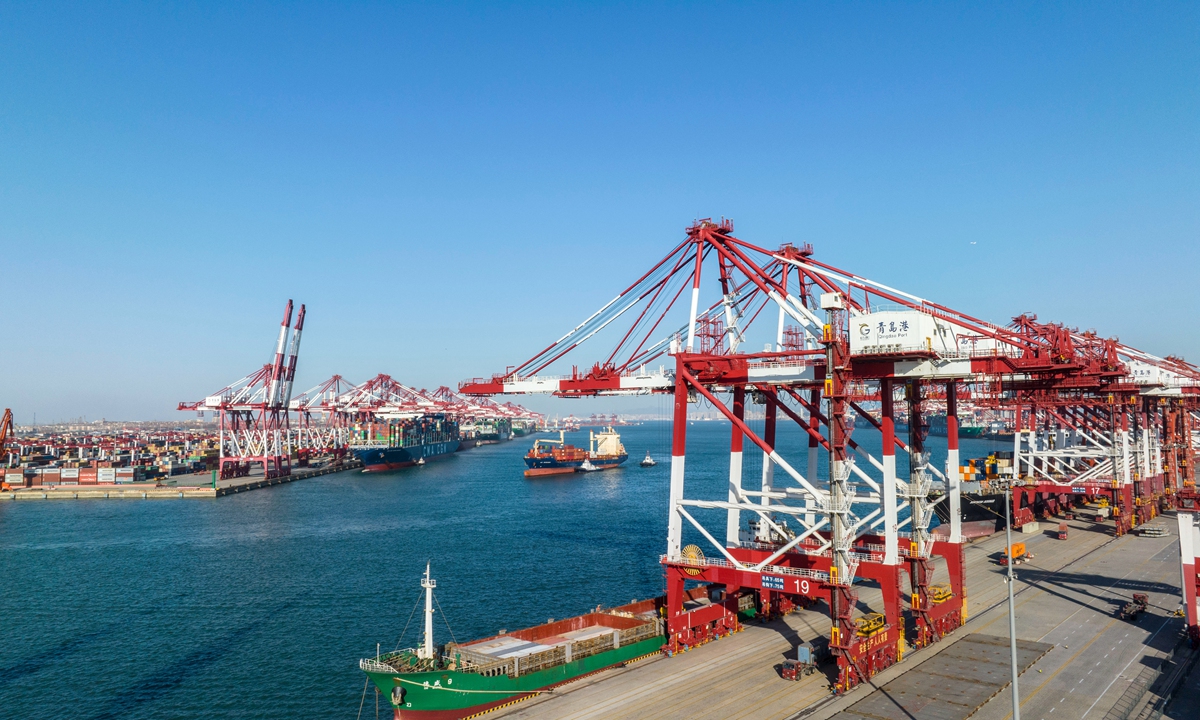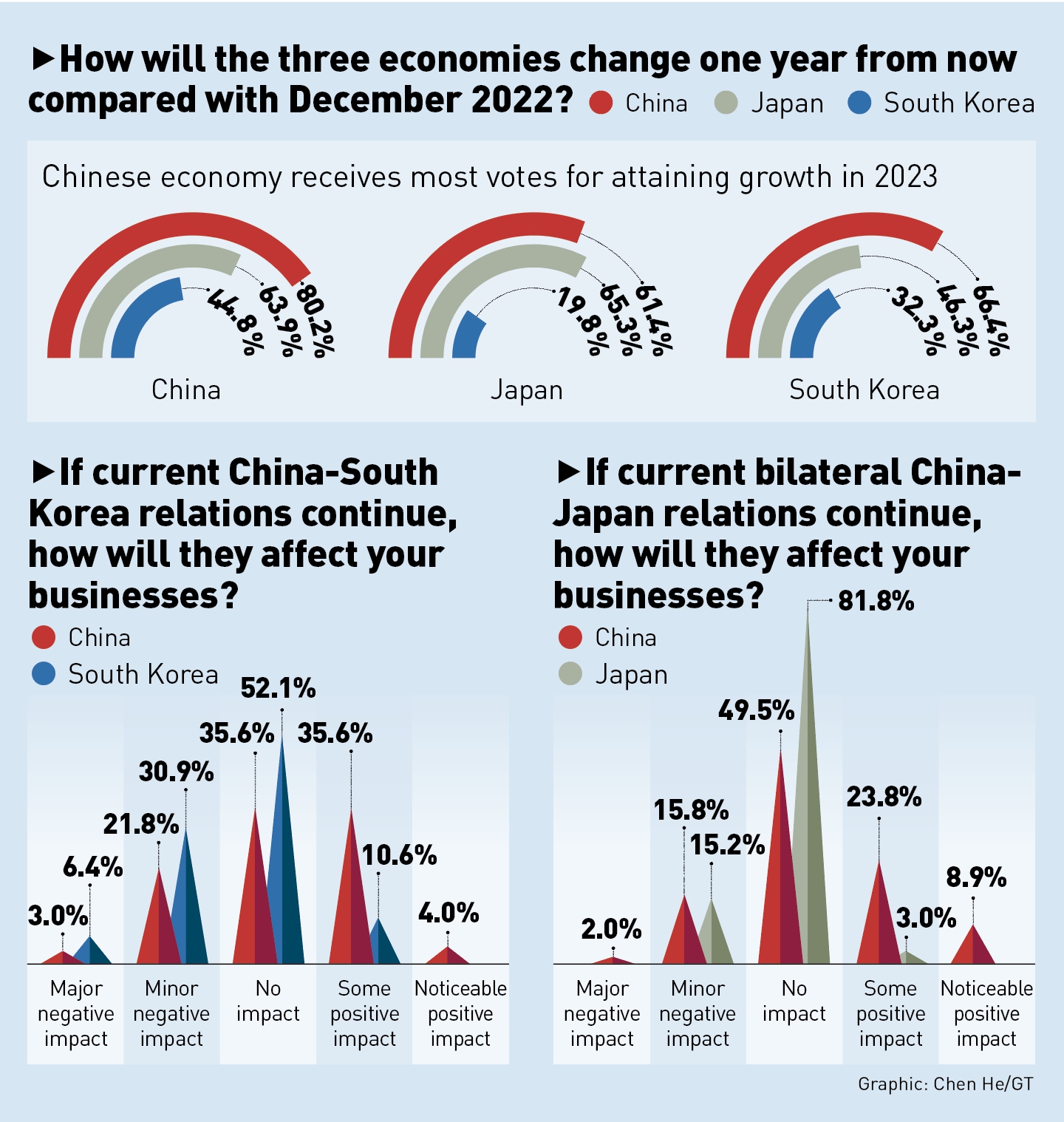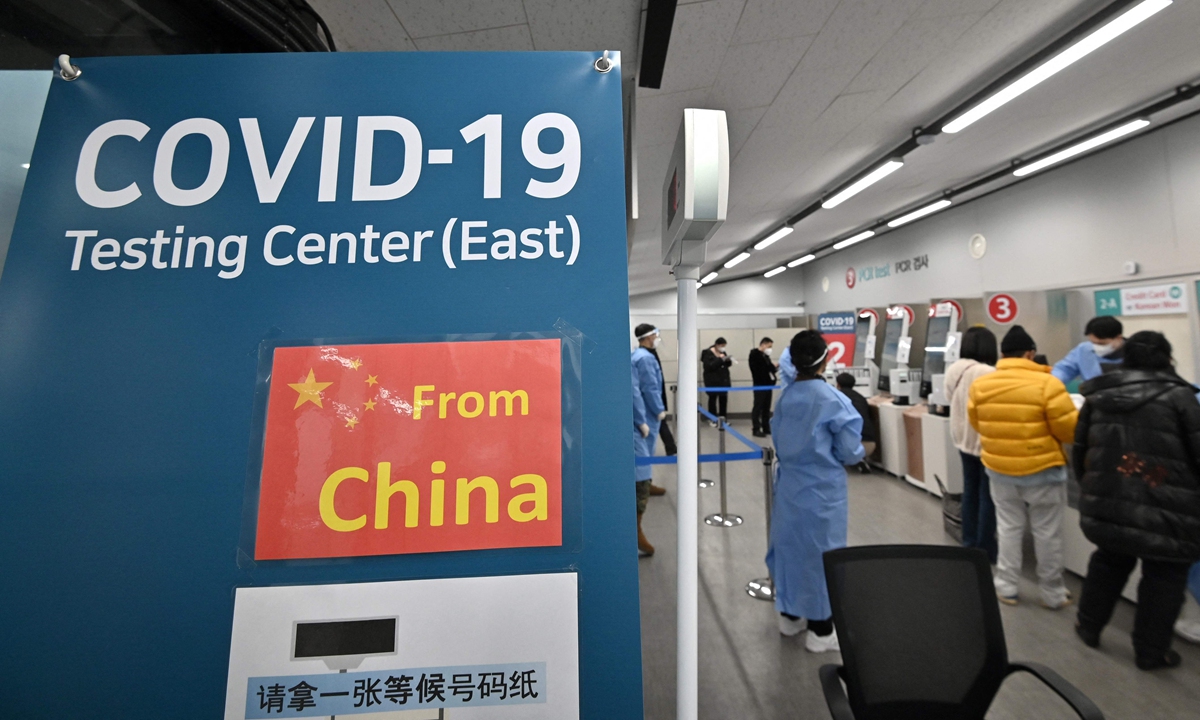Chinese economy seen as the most optimistic in 2023, survey by senior executives from China, Japan and South Korea shows
Experts call for elimination of political interference that hurts economic ties

Photo shows the Qingdao Port in East China's Shandong Province on January 9. The port has fully established a "China-Japan-South Korea marine highway" with more than 30 container lines between Japan and South Korea, and more than 100 ships to ports in the two countries weekly. Photo: VCG
The Chinese economy is seen as having the most optimistic outlook in 2023, a year filled with recession worries, a survey among over 270 senior executives in China, Japan, and South Korea showed.
Following downgraded COVID-19 management in China and the reopening of the borders on January 8, the Chinese economy is expected to be the one most likely to attain rapid or moderate economic growth, when compared with those of Japan and South Korea, according to a joint survey conducted by the Global Times Research Center, Maeil Business Newspaper, and the Nikkei.
A total of 80.2 percent of respondents from China, 63.9 percent from Japan, and 44.8 percent from South Korea say China will attain growth in 2023, way higher than those who voted for Japan and South Korea, per the survey, showing China has the most optimistic outlook.
Chinese senior executives are the most optimistic on economic recovery in 2023, while those from Japan and South Korea were less so.
On the global economic outlook for 2023, over 70 percent of surveyed Chinese senior executives had an optimistic view while only 10.9 percent believed the global economy will slowly or quickly deteriorate.
In comparison, about 30 percent of surveyed Japanese firms expect the global economy to grow while over 30 percent believe the world economy will slow in 2023.
Firms from South Korea are the least optimistic, with just 21.9 percent being of the view that the world economy will grow and 51 percent expect deterioration.
With regard to economic growth in their home countries, South Korean firms were also the least optimistic while firms from China and Japan were far more bullish, the survey showed. A similar result was found in how companies anticipate a recovery back to the pre-pandemic levels.

Build bridges, not walls
The survey, which was conducted between December 12 to 21, 2022 received responses from 101 Chinese, 96 South Korean, and 74 Japanese senior executives.
The survey was conducted as the global economic recovery reaches a critical juncture. On Tuesday, the World Bank sharply downgraded its global economy growth outlook to 1.7 percent, from the 3 percent growth it had projected only six months ago.
South Korea's economy, which is seen as a barometer for the global economy, saw its first trade deficit in 14 years, at a record $47.2 billion, in 2022, according to the country's the Ministry of Trade, Industry and Energy.
Surveyed senior executives from the three countries agree that the relaxation on epidemic control measures will be the major factor contributing to economic recovery in 2023, while 56.5 percent of Chinese and 59.4 percent of South Korean firms stated that their businesses suffer major or minor negative impacts from China-US conflict.
South Korean firms also expressed a pessimistic outlook on their business prospects should the bilateral relations between China and South Korea continues as they currently are, with nearly 40 percent of the surveyed foreseeing negative impacts on their future business prospects.
By contrast, just 15.2 percent of Japanese companies see minor negative impact if the current state of bilateral relations between China and Japan continue.
Chinese experts said that in order to further economic cooperation between China, South Korea and Japan, the three biggest economies in Asia that, together, represent around 25 percent of the world's GDP, politicians in South Korea and Japan should rein in their political interference.
Bai Ming, deputy director of the international market research institute at the Chinese Academy of International Trade and Economic Cooperation, told the Global Times on Wednesday that the negative impacts resultant from politics need to be checked for China-South Korea and China-Japan economic ties to further expand.
South Korea and Japan should stop playing the role of US lackeys, a country determined to curb China's economic and technology rise with crackdowns and by making troubles in the region, Bai said.
China will not yield over matters of its sovereignty and developmental interests, and South Korea and Japan's following the lead of the US will impose limits on economic cooperation, Bai said.
In 2022, the US pushed its Chip 4 alliance, a strategy aimed at weakening China's strength in the vital semiconductor supply chain. It became a roadblock for China-South Korea and China-Japan economic ties.
Though South Korea took a more measured approach in the matter, the issue remained a hidden hazard for bilateral ties.
In 2022, Japan passed and enacted the so-called economic security act, which mimics tactics the US' strategy of enclosing China, experts said. Also, Japan has been an active player in the Indo-Pacific Economic Framework for Prosperity, a US regional development plan with the aim of excluding China.
In one of the latest incidences of political manipulation undermining economic exchanges, the three countries engaged in a visa-spat after South Korea and Japan hyped up China's epidemic situation by imposing travel restrictions.
Li Tianguo, an associate professor at the National Institute of International Strategy, warned South Korea and Japan not to subject their foreign policies to external influence.
The warning came against the backdrop of the US promoting unilateral and trade protectionist policies and a decoupling policy with China at a time when countries around the world had to reorient their supply chains in wake of the COVID-19 pandemic.
"Policies of exclusion and group politics stand in opposition to the basis of decades of prosperity in the region, which benefited both South Korea and Japan greatly," Li told the Global Times.


